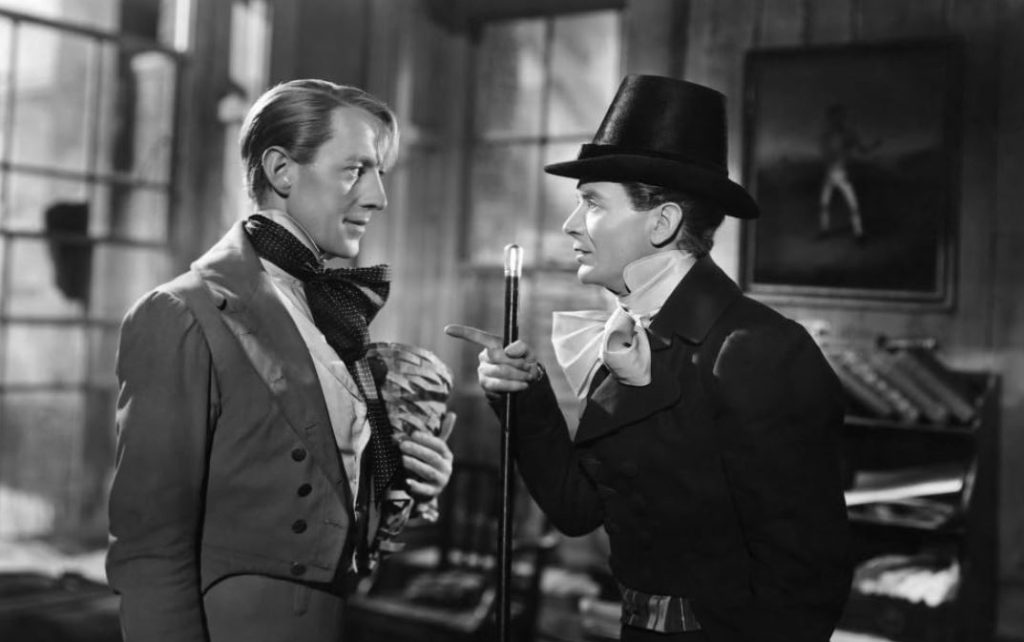
Directed by David Lean.
Screenplay by David Lean, Anthony Havelock-Allan &Ronald Neame
Based on the 1861 novel by Charles Dickens.
With: John Mills, Valerie Hobson, Bernard Miles (who we’ll see ten years later as a kidnapper in The Man Who Knew Too Much). Here, he is kindly blacksmith, Joe), Francis L. Sullivan as Mr. Jaggers (in 1948 he appears as Mr. Bumble :”The law is an ass” in David Lean’s Oliver Twist), Anthony Wager, Jean Simmons, Finlay Currie & Alec Guinness as Herbert Pocket
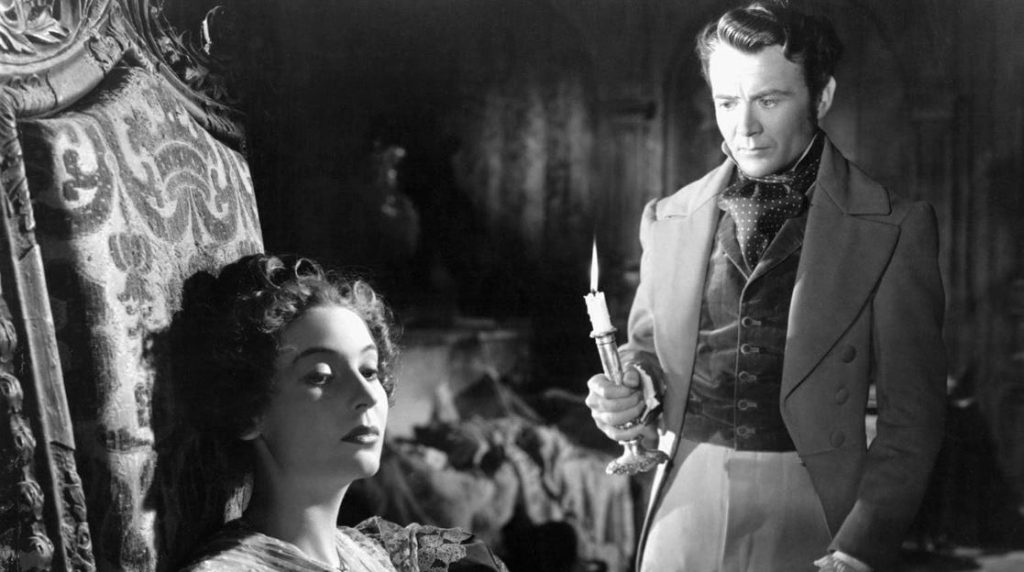
Great Expectations is a puzzle story typical of Charles Dickens, a story that began years before we meet Phillip “Pip” Pirrip, the young lad who will shortly after the story begins be the recipient of great expectations. Big things have small beginnings.
We meet Pip on a dark and stormy night on the moors of Kent as he is about to place flowers on his mother’s grave. The clouds (in glorious black&white) speak menace from above and the branches of a dead tree, similar branches that will tap ominously against young Yuri Zhivago’s bedroom window twenty years hence, seem about to reach out and grab him.
He starts to flee and runs right into the arms of an escaped convict bound for penal transport to Australia. His crime? Poverty and a lower-class accent under the Hanoverian Dynasty.
Pip confesses to living with this sister and her blacksmith husband, the “kindly Joe” in a nearby house: “You bring me, tomorrow morning early, that file and them wittles.” Magwitch tells the terrified child to fetch back food and a file.
“You fail, or you go from my words in any partickler, no matter how small it is, and your heart and your liver shall be tore out, roasted, and ate. Now, I ain’t alone, as you may think I am. There’s a young man hid with me, in comparison with which young man I am a Angel. That young man hears the words I speak. That young man has a secret way pecooliar to himself, of getting at a boy, and at his heart, and at his liver.”
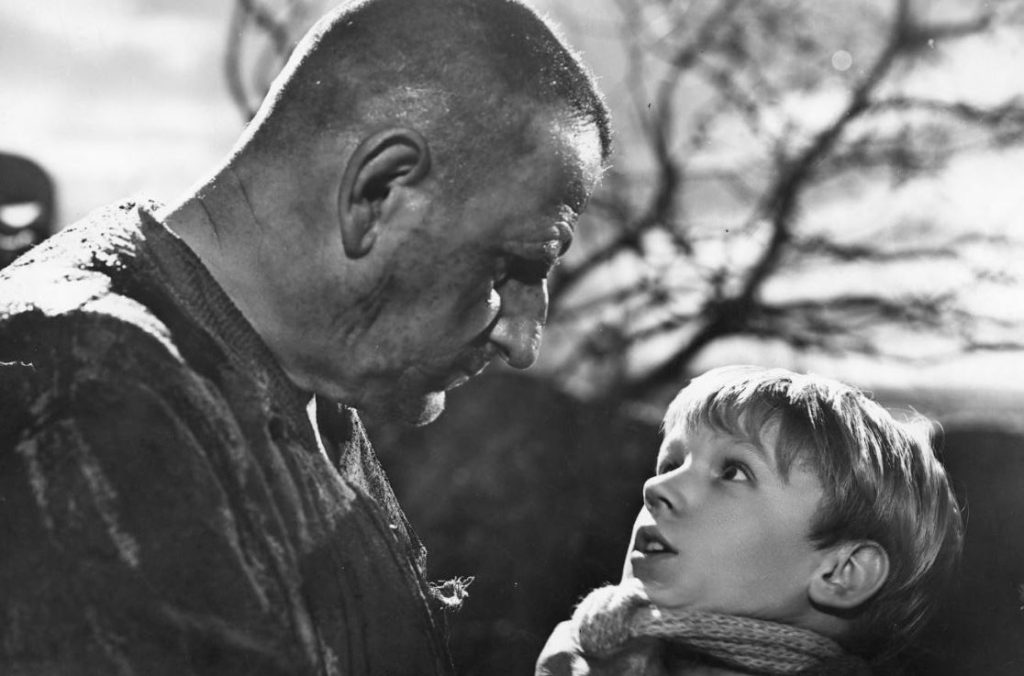
“A boy may lock his door, may be warm in bed, may tuck himself up, may draw the clothes over his head, may think himself comfortable and safe, but that young man will softly creep and creep his way to him and tear him open.
Now, what do you say?”
Pip is convinced as you might expect, and the next day, Christmas, with no Tiny Tim or Ebenezer Scrooge and Marley was dead: there was no doubt whatever about that., he fetched the file, a pork pie and a bottle of brandy and returned with the items to the convict, Abel Magwitch, a man central to the plot.
The peelers capture Magwitch and off he goes on the months long voyage to New South Wales.
The Bildungsroman continues a short time later when Pip is summoned to the decaying mansion of a crazed old woman, Miss Havisham, still clad in the wedding dress she wore the day she was left at the altar. A bitter old woman vowing revenge on the male species.
Time stopped for Miss Havisham at the moment of her profound disappointment. Ain’t love grand?
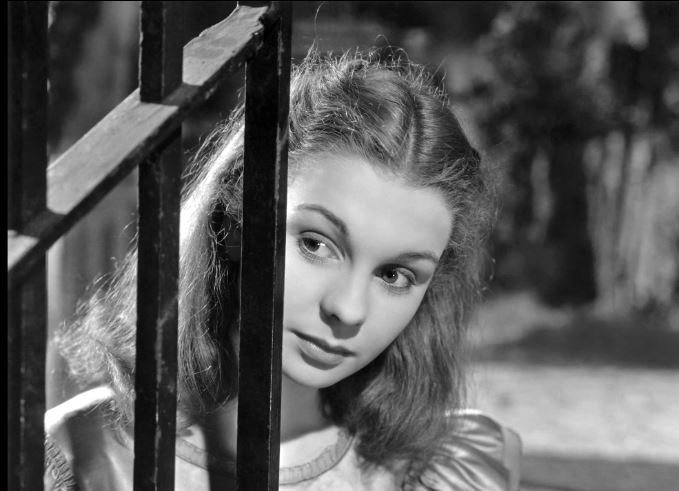
The agent of her vengeance is her ward, the lovely young Estella, played when young by the lovely young Jean Simmons (the older version by Valerie Hobson). She is being raised to be a heartless beauty. A determined heartbreaker of men.
Pip has been summoned for the amusement of Miss Havisham, but more importantly, to give young Pip his taste of puppy love, for Estella. He will meet his future friend Herbert Pocket, who fancies himself something of a pugilist, like so many foolish men.
Pip had barely begun his apprenticeship as a blacksmith years later when the lawyer Mr. Jaggers tells him of his good fortune. An unknown benefactor has determined that Pip must be a gentleman, Meaning a good income and an aimless life as a London voluptuary.
The heartless and beautiful Estella, lurks on the sidelines of the story.
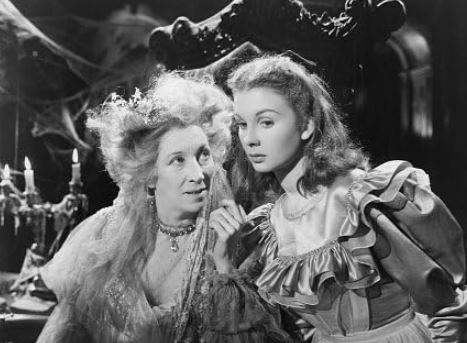
What follows is a streamlined version of Dickens’ 550-page novel.
By the end the puzzle is solved and Pip rediscovers the virtue of honest labor. We get a view of the evils of the class system and the barbaric brutality of the criminal justice system, a system that imposed death for the most minor of offenses. The most common being hanging by the short drop method wherein the condemned strangled for up to 20 minutes. A return to England after being transported to Australia rated this punishment.
Pip is reunited with Estella at the ruins of Miss Havisham’s mansion, the bitter women having perished when her ancient wedding dress caught fire. Estella seems determined to take her place.
Pip will not allow this to happen, and leads her into the light giving us the impression love will conquer after-all and the two will marry.
The novel’s ending differs slightly.
“We are friends,” said I, rising and bending over her, as she rose from the bench.
“And will continue friends apart,” said Estella.
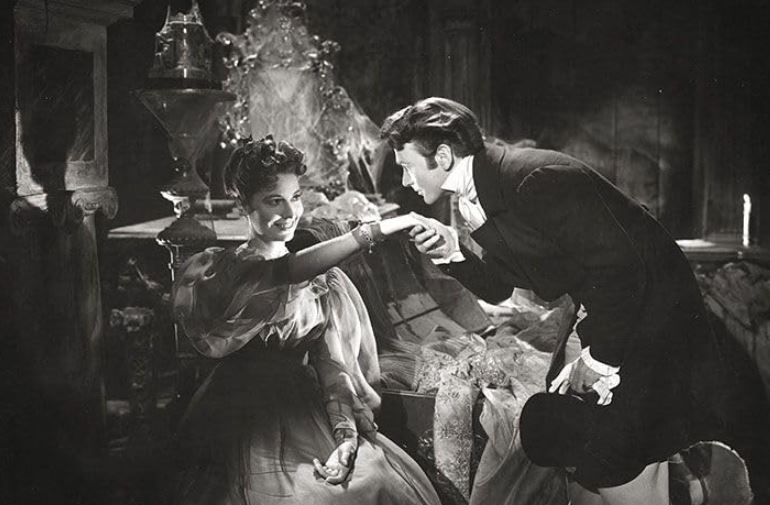
I took her hand in mine, and we went out of the ruined place; and, as the morning mists had risen long ago when I first left the forge, so the evening mists were rising now, and in all the broad expanse of tranquil light they showed to me, I saw no shadow of another parting from her.”
Two years later Lean would adapt Oliver Twist to the screen with an outstanding performance by Alec Guinness as Fagin.
In James Agree’s opinion Great Expectation provided the perfect model for adapting Dickens to the screen. I agree. Lean had the ability to convey story and emotion with images simply suggested by words on the page.
Leave a Reply